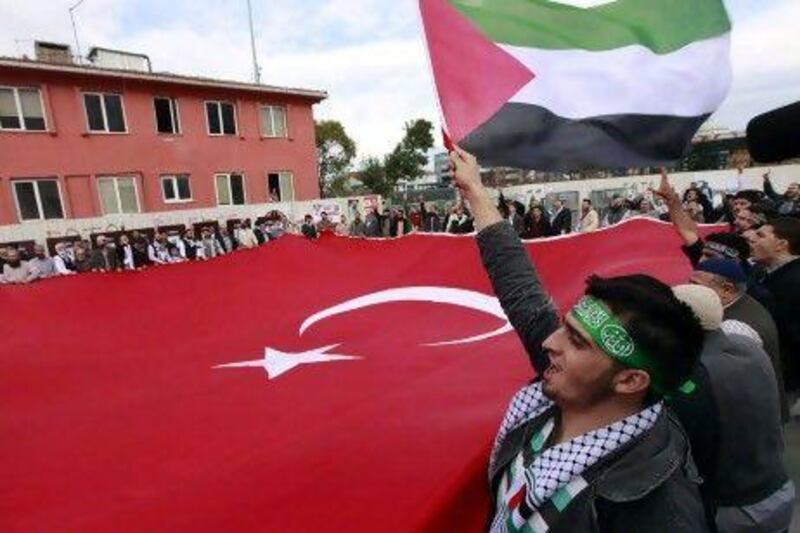ISTANBUL // The start of a trial in absentia against four former Israeli military commanders for ordering a deadly raid on a Gaza-bound ship in 2010 was sharply criticised yesterday by Israel's government as a "propaganda showcase".
Turkish prosecutors are seeking life sentences against the four officers for ordering the raid in which nine activists were killed. The vessel was attempting to break Israeli-imposed blockade on the Palestinian territory.
The Israeli foreign ministry spokesman Yigal Palmor said the legal proceedings were "a show trial that "has nothing to with law and justice.
"The so-called accused have not been notified or informed in any way that they are going to face charges or what the nature of the charges is. They haven't been given even a symbolic chance to have legal representation," Mr Palmor told Agence France-Presse
As the trial opened, several hundred demonstrators gathered outside the Palace of Justice in Istanbul's Caglayan neighbourhood, waving Palestinian flags and wearing headbands that read "We are all Palestinians". Two big white balloons, tethered to the ground and bearing the slogan "Israel is standing trial", hovered overhead.
Inside, Istanbul's high criminal court started proceedings against former Israeli military officers for ordering the raid on the ship, the Mavi Marmara, which resulted in the death of nine activists on board the vessel in the early hours of May 31, 2010.
Prosecutors are seeking life sentences against the commanders, former chief of staff Gaby Ashkenazi, former navy chief Eliezer Marom, former military intelligence head Amos Yadlin and former air force intelligence chief Avishai Levy. The four officers did not attend trial and were officially listed as "fugitive defendants".
An Islamic charity based in Istanbul, the Foundation for Human Rights and Freedoms and Humanitarian Relief (IHH), the owner of the MVMavi Marmara, said there were 490 plaintiffs in the trial, among them family members of victims of the raid. According to the IHH, a total of several hundred civil suits against Israel are expected to be opened around Turkey in the coming months.
The criminal trial against the former Israeli commanders is largely symbolic, because if convicted they will not be jailed should they stay away from Turkey.
But the trial could further complicate efforts to repair ties between former allies Turkey and Israel.
The Mavi Marmara incident sent relations into a crisis, with Turkey expelling the Israeli ambassador and listing three conditions for a normalisation of ties: an Israeli apology for the raid, compensation for the victims and an end to the blockade of the Gaza Strip - all of which were rejected.
Turkish officials have turned down recent calls by Israel to start talks about the Mavi Marmara incident. Pinhas Avivi, a senior official in Israel's foreign ministry, told Turkish reporters last month that the two countries should look ahead. Ahmet Davutoglu, Turkey's foreign minister, said around the same time that many of his foreign minister colleagues on the international stage were telling him that Israel wanted to reconcile.
Mr Davutoglu accused Israel of trying to create the impression that it was ready for compromise while Turkey refused to repair relations.
"No, Israel is guilty, and the one who is guilty has to do what is necessary," Mr Davutoglu said, according to the semi-official Anadolu news agency. "Before [Israel] does that, no one should expect us to take any steps," he added in reference to Turkey's three conditions.
Several international inquiries into the Mavi Marmara incident did not result in the clear condemnation of Israel that Turkey sought.
Last year, an Israeli inquiry ruled that the raid did not violate international law, in a finding that Turkey said lacked credibility. A UN report in September 2011 found Israel had used excessive force in the raid, but also said Israel's naval blockade of Gaza was legal and that the flotilla organisers had acted recklessly in attempting the mission.
In Istanbul yesterday, demonstrators in front of the courthouse welcomed the trial as a chance to expose what they saw as Israeli injustice.
"We are here to have our voices heard, we want the whole world to know that Israel did wrong," said Busra, a high school student wearing a headscarf, who had come to the courthouse with two friends, Ceren and Merve. The girls, aged 17, gave their first names only because they had skipped school to be able to take part in the demonstration in Caglayan.
"The trial is a symbol, a first step," Ceren said. "My mother told me not to come here because she said it wouldn't change anything. But we are here all the same."
Yusuf Kerem Erdin, a 33-year-old white collar employee at a construction company, said the Turkish government's response to the Mavi Marmara raid had been inadequate. "We want the Israeli consul [in Istanbul] to be expelled as well," he said. "We should go on until Jerusalem has been liberated."
Several protesters insisted that they did not have problems with the Israeli people or with Jews in general, but only with the Israeli government.
"The fact is, there was a massacre," said Battal Yener, a 42-year-old Turkish civil servant who had taken the day off to come to the courthouse with three colleagues.
"In the Ottoman Empire, we opened our gates to the Jews," he said, referring to the immigration of Jews from Spain to Turkey in the 15th century. "We would be here even if the victims had been not Muslims, but Christians or Buddhists."
tseibert@thenational.ae





